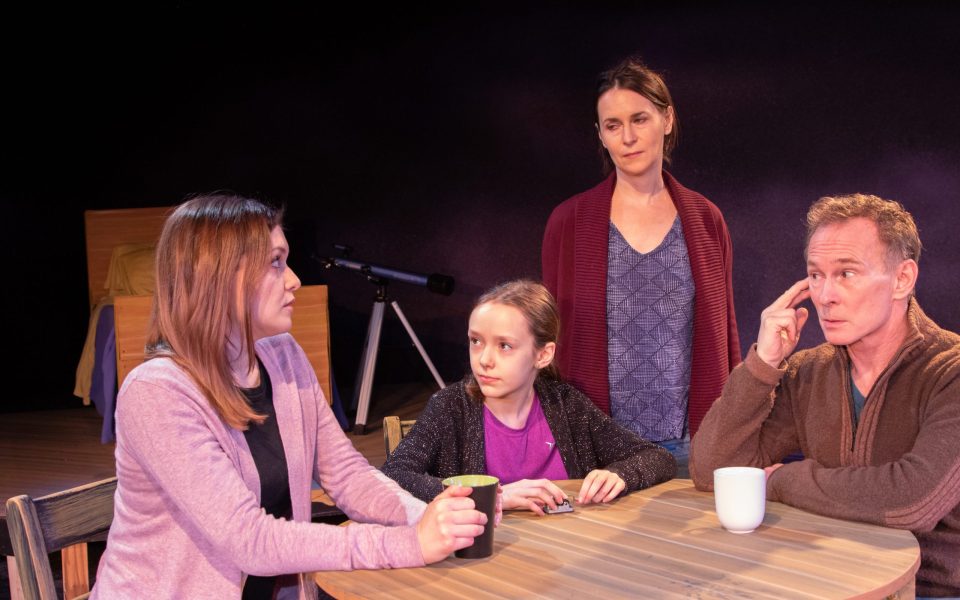“Cold is the best way to look at the sky,” Grace says to her concerned husband, her gaze lost in the glittering distance. “Everything is clear in the dead of winter.”
Cassandra Weston, as Grace, stands behind the 5-foot macramé telescope fixed to a wooden tripod mere feet from the audience at the outset of the Drama Center’s presentation of Starbright, winner of the 2019 New Play Project, in the Stephen D. Hyers Studio Theatre on Jan. 17. Sean David Robinson’s first full-length script premiered off Broadway last summer before kicking off the 16th annual Greensboro Fringe Festival, which spotlights new theater and dance through Feb. 4. The Winston-Salem-born playwright collaborated on the 5-year project, about a brilliant astronomer struggling in the aftermath of her daughter’s death, with his wife Courtney as dramaturg. Fringe Fest founder Todd Fisher directed the production.
“The actors came to some really interesting interpretations that I found informative on a granular level and considering I’m still in the revision process it was good to see,” he says. “Ultimately, theater is a communal art, and those long, lonely hours spent in front of the keyboard mean nothing without the people willing to believe in my script as though it were their own.”
Nearly a year after Grace loses her job at a research university following a “nervous breakdown,” she discovers her daughter Abigail’s music box singing from a neatly-made twin bed. And then the smell of lavender hits — Abby used to spray lavender in her hair, often pulled tight into a ponytail. Her daughter appears to her, the first of many hallucinations.
Throughout the production, lullabies fill the intimate box theater during scene transitions until a giant paper lantern globe illuminates Grace and Calvin’s quiet home again.
Calvin, played by Pete Turner, chooses to swallow his despair and to coat his white-knuckled coping strategy with comic relief as he struggles to keep them financially afloat. But they haven’t paid the mortgage in three months and are confronting the task of selling the house with ever-dwindling “imprints of her”: drawings on the fridge, smudges on the wall, her little shoes in the hallway. Now there’s nothing, no reminders but the place-setting Grace refuses to stop laying out, and his humor isn’t doing anything more than the diazepam she’s cast aside. As time wears on, Calvin is less capable — or less interested — in laboring to maintain a lighter emotional landscape and grows frustrated with Grace’s sister Claire, a talk therapist who’s providing Grace’s treatment.
“I think you’re doing a really good job of staying strong for Grace and I think that’s a mistake,” Claire, played by Regan Deal, says. “It’s easy to feel like you’re going through this alone and you are, really, because while you’re busy staying strong Grace is suffering very outwardly and, in the meantime, you’re not connecting anywhere in the middle…. You’re no good to her if you let this break you…. Grace’s [grief] has turned into voices and visions — what’s yours gonna to turn into?”
Rage, it turns out. He talks about “real” treatment; he wants her “fixed.”
But Abigail, played by Yamur Samli, continues to regale her mother with fantastical tales of disembodied space travel and forewarns her of the birth of a new star that would shift “the accepted paradigm of solar genesis.” Gleeful, Grace plunges into hurried calculations at the kitchen table, hopeful that if she predicts the event she’ll be reinstated at the university, that food might not taste like cardboard much longer.
“There is a star out there, a brand-new star that shouldn’t exist, an impossible star, and you want me to walk away? You want me to go sit in a padded room and take pills and drool on the carpet… until you can get our lives sorted out for us? Maybe that’s best for you; you love putting things into neat little boxes: our house, Abby’s things, why not your wife, too?”
Grace sights the impossible star, flushed with the warmth of vindication in the cold night, as an ambulance alarm wails nearer. He’s committing her, involuntarily.
“What worries me the most is you might not want to fix this, like you want to dive deeper,” Claire had said, earlier that evening. “You have the same look in your eyes when you talk about Abby as you do when you talk about black holes and dark matter. She’s not real, Grace…. She’s a figment.”
But her sister does dive, though skyward, up through the telescope’s tunnel to the floor of an in-patient facility where she sits cross-legged in striped pajamas and rubber-bottomed, Big Bird-yellow hospital socks, where her daughter reveals, at last, the inside of a black hole. “Twinkle, Twinkle Little Star” begins as mother and daughter fold into the infinitesimal, unwavering and weightless light.
Join the First Amendment Society, a membership that goes directly to funding TCB‘s newsroom.
We believe that reporting can save the world.
The TCB First Amendment Society recognizes the vital role of a free, unfettered press with a bundling of local experiences designed to build community, and unique engagements with our newsroom that will help you understand, and shape, local journalism’s critical role in uplifting the people in our cities.
All revenue goes directly into the newsroom as reporters’ salaries and freelance commissions.


Leave a Reply